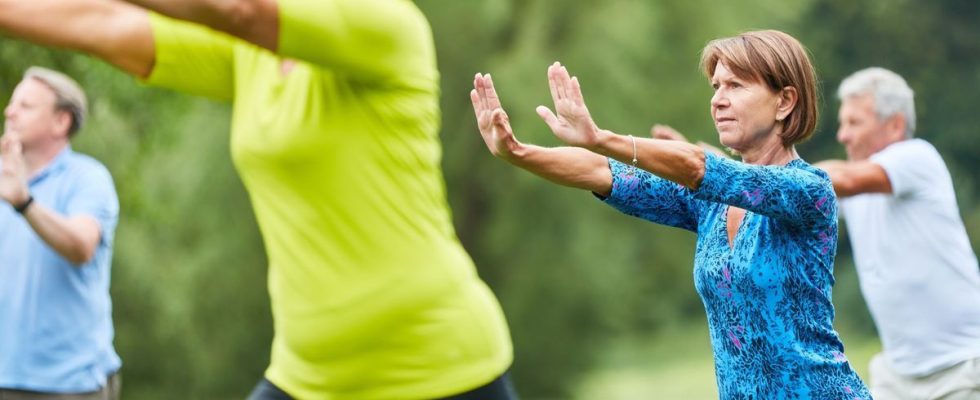Published on
Updated
Reading 2 min.
Tai chi, a Chinese martial art which consists of slow movements, could be a source of benefits in Parkinson’s disease. Indeed, according to the results of a new study, practicing it regularly would allow patients to slow down their symptoms and the complications of this neurodegenerative pathology.
Do you know Tai chi? It is a Chinese martial art, which consists of sequences of slow and controlled movements. According to the results of a new study, its practice could help Parkinson’s patients.
Benefits already demonstrated in the short term
Previous studies have already demonstrated the short-term benefits of this martial art in Parkinson’s disease. This time, Chinese researchers wanted to demonstrate the persistence of these positive effects in the long term. To do this, they monitored two groups of patients for more than five years, between January 2016 and June 2021.
The first group, made up of 147 patients, practiced Tai chi twice a week for one hour. The other group, made up of 187 patients, continued their usual care but did not practice tai chi. Disease severity, medication use, gender, age and education level were similar in both groups.
Practicing Tai chi improves symptoms and reduces medication intake
Results: the practice of this martial art is associated with slower progression of the disease and less medication intake over time, according to the scientists’ results.
For example, the number of patients requiring an increase in the dose of their treatments was greater in the control group than in the group practicing the martial art: 83.5% in 2019 compared to 71% and just over 96% in 2020 versus 87.5%.
Additionally, patients’ cognitive functions deteriorated more slowly in the tai chi group, as did other non-movement-related symptoms, while sleep and quality of life continually improved. Finally, falls, dizziness and back pain – three side effects reported by study participants – were all significantly lower in the Tai chi group.
An observational study, the results of which must be confirmed
The researchers note some limitations to their work: the fact that it is an observational study does not allow them to establish a formal cause and effect link. In addition, the relatively small number of participants also represents a limitation, as does the fact of not having distributed the two groups randomly.
However, they believe that this work “showed that tai chi retains the long-term beneficial effect on Parkinson’s disease.. Before concluding : “Parkinson’s disease can progressively worsen patients’ motor function and non-motor symptoms over time, leading to disability and influencing quality of life. The long-term beneficial effect of Tai chi on disease could extend the lifespan of patients without disability, leading to a better quality of life, less medication consumption and ultimately representing a lower burden for caregivers.
